
Knute Kenneth Rockne was a Norwegian-American football player and coach at the University of Notre Dame.

Knute Rockne, All American is a 1940 American biographical film which tells the story of Knute Rockne, Notre Dame football coach. It stars Pat O'Brien as Rockne and Ronald Reagan as player George Gipp, as well as Gale Page, Donald Crisp, Albert Bassermann, Owen Davis Jr., Nick Lukats, Kane Richmond, William Marshall and William Byrne. It also includes cameos by legendary football coaches "Pop" Warner, Amos Alonzo Stagg, William H. Spaulding, and Howard Jones, playing themselves.
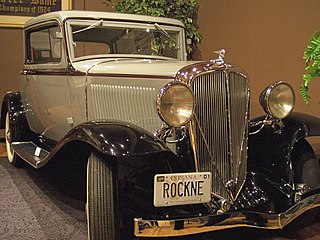
The Rockne was an American automobile brand produced by the Studebaker Corporation of South Bend, Indiana, from 1932-1933. The brand was named for University of Notre Dame football coach Knute Rockne.
Warren Brown was an American sportswriter who spent the major portion of his career in Chicago, Illinois. Brown was named a 1973 J. G. Taylor Spink Award winner by the National Baseball Hall of Fame, and was inducted the same year as Mickey Mantle, Whitey Ford, Cool Papa Bell, and umpire Jocko Conlan.
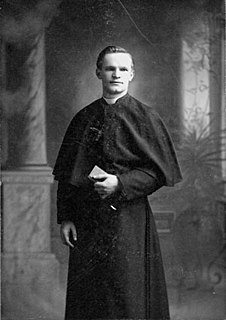
Reverend Julius Aloysius (Arthur) Nieuwland, CSC, PhD, was a Belgian-born Holy Cross priest and professor of chemistry and botany at the University of Notre Dame. He is known for his contributions to acetylene research and its use as the basis for one type of synthetic rubber, which eventually led to the invention of neoprene by DuPont.

William K. Howard was an American film director, writer, and producer. Considered one of Hollywood's leading directors, he directed over 50 films from 1921 to 1946, including The Thundering Herd (1925), The Power and the Glory (1933), Fire Over England (1937), and Johnny Come Lately (1943).

Heartley William "Hunk" Anderson was an American football player and coach. He served as the head football coach at the Saint Louis University (1928–1929), University of Notre Dame (1931–1933), and North Carolina State University (1934–1936), compiling a career college football record of 34–34–4. From 1942 to 1945, Anderson was the head coach for the Chicago Bears of the National Football League (NFL), tallying a mark of 24–12 and winning the 1943 NFL Championship.

Marchmont H. "Marchy" Schwartz was an American football player and coach. He played college football at the University of Notre Dame from 1929 to 1931, and was a two-time All-American at halfback. Schwartz served as the head football coach at Creighton University from 1935 to 1939 and at Stanford University from 1942 to 1950, compiling a career college football coaching record of 47–50–6; Stanford, like may other universities, suspended football during World War II. He was inducted into the College Football Hall of Fame as a player in 1974.
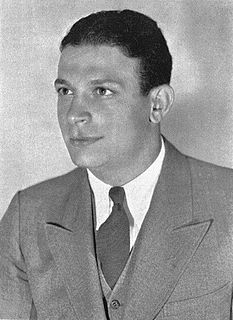
Francis F. Carideo was an American football player and coach of football and basketball. He played quarterback at the University of Notre Dame from 1928 to 1930, where he was a two-time All-American. Carideo served as the head football coach at the University of Missouri from 1932 to 1934, compiling a record of 2–23–2. He was also the head basketball coach at Mississippi State University from 1935 to 1939, tallying a mark of 43–39. Carideo was inducted into the College Football Hall of Fame as a player in 1954.

Howard Harpster was an American football player and coach. He played college football as a quarterback at the Carnegie Institute of Technology—now known as Carnegie Mellon University—from 1926 to 1928. He was consensus selection to the 1928 College Football All-America Team. Harpster served as the head football coach at Geneva College in Beaver Falls, Pennsylvania from 1930 to 1932 and at his alma mater, Carnegie Tech, from 1933 to 1936, compiling a career coaching record of 34–25–5. He was inducted into the College Football Hall of Fame as a player in 1956.
John Edward Chevigny was an American football player, coach, lawyer, and United States Marine Corps officer who was killed in action on the first day of the Battle of Iwo Jima in World War II. He is best known for scoring the famous "that's one for Gipper" touchdown for Notre Dame on November 10, 1928 versus Army at Yankee Stadium. One of the Great Depression-era football stars, he was one of the best blocking backs for Knute Rockne's Notre Dame football team in the 1920s. Chevigny later served as the head coach of the NFL's Chicago Cardinals in 1932 and the head football coach at the University of Texas from 1934 to 1936.
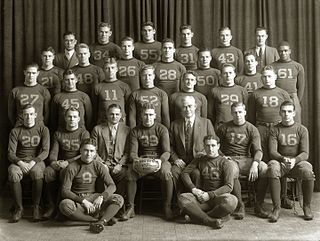
The 1932 Michigan Wolverines football team represented the University of Michigan in the 1932 Big Ten Conference football season. Under fourth-year head coach Harry Kipke, Michigan compiled a perfect 8–0 record, outscored opponents 123–12, and won both the Big Ten Conference and national championships. The defense shut out six of its eight opponents and gave up an average of only 1.6 points per game. Although there was no AP Poll to determine a national champion in 1932, the Knute K. Rockne Trophy was presented at the end of the season to the team deemed to be the national champion using the Dickinson System, a rating system developed by Frank G. Dickinson, a professor of economics of the University of Illinois. Michigan won the Rockne Trophy, edging Southern California in the Dickinson rating system.

Thomas Emmet Mills was an American football player, coach of football, basketball, and baseball, and college athletics administrator. He served as the head football coach at Creighton University (1915–1919), Beloit College (1920–1925), Georgetown University (1930–1932), and Arkansas State College (1934–1935), compiling a career college football record of 63–45–12. Mills was the head baseball coach at the University of Notre Dame from 1927 to 1929, during which time he was also an assistant football coach at the school under Knute Rockne. In addition, Mills was the head basketball coach at Creighton (1916–1920), Beloit (1920–1923), and Arkansas State (1935–1936), amassing a career college basketball record of 107–25. Mills died at the age of 60 on February 25, 1944, of a heart attack at the Rockne Memorial Field House in Notre Dame, Indiana. He served as the director of the field house for the four years before his death.

The Piquette Avenue Industrial Historic District is a historic district located along Piquette Street in Detroit, Michigan, from Woodward Avenue on the west to Hastings Street on the east. The district extends approximately one block south of Piquette to Harper, and one block north to the Grand Trunk Western Railroad Line. It was listed on the National Register of Historic Places in 2004.
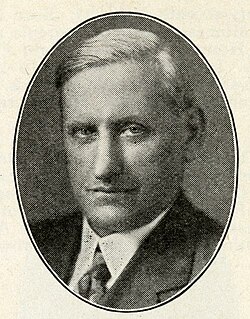
Anton Julius "A.J." Rockne was a Minnesota Republican politician, and the longest-serving state senator in the history of Minnesota.

Claude Bracey, known variously as the "Texas Flyer," the "Dixie Flyer," and the "Texas Tornado," was an American sprinter who tied world records in the 100-yard and 100-meter races between 1928 and 1932. He competed for the United States at the 1928 Summer Olympics in Amsterdam and also won the 100-yard and 220-yard sprints at the 1928 NCAA Men's Track and Field Championships.
The 1932 USC Trojans football team is an American football team that represented the University of Southern California (USC) in the Pacific Coast Conference (PCC) during the 1932 college football season. In its eighth season under head coach Howard Jones, the team compiled a perfect 10–0 record, won the PCC championship, shut out eight of ten opponents, defeated Pittsburgh in the 1933 Rose Bowl, and outscored all opponents by a total of 201 to 13.
William Rockne Tarkington, Jr. was an American stage, film and television actor.

The 1932 Pittsburgh Panthers football team was an American football team that represented the University of Pittsburgh as an independent during the 1932 college football season. In its ninth season under head coach Jock Sutherland, the team compiled an 8–1–2 record, shut out eight of its eleven opponents, suffered its sole loss to USC in the 1933 Rose Bowl, and outscored all opponents by a total of 182 to 60. The team played its home games at Pitt Stadium in Pittsburgh.
The 1932 Big Ten Conference football season was the 37th season of college football played by the member schools of the Big Ten Conference and was a part of the 1932 college football season.














